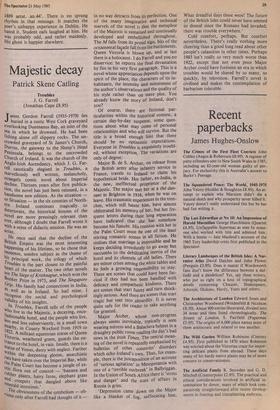Majlestic decay
Patrick Skene Catling
Troubles
J. G. Farrell
(Jonathan Cape £8.95)
James Gordon Farrell (1935-1979) lies buried in a rustic West Cork graveyard overlooking Dunmanus Bay, an inlet of the sea in which he drowned. He had been fishing alone off slippery rocks. The un- crowded graveyard of St James's Church, Durrus, the gateway to the Sheep's Head Peninsula, belongs to the uncrowded Church of Ireland. It was the church of the Anglo-Irish Ascendancy, which J. G. Far- rell caustically elegised in Troubles, a Marvellously well written, melancholy, strangely comic novel about Imperial decline. Thirteen years after first publica- tion, the novel has just been reissued, in a handsome new edition. As the situation or Situation — in the six counties of North- ern Ireland continues tragically to deteriorate, the historical lessons of the novel are more pressingly relevant than ever, although I doubt that Farrell wrote it With a sense of didactic mission. He was an artist.
He once said that the decline of the
British Empire was the most interesting happening of his lifetime, so he chose that immense, sombre subject as the theme of his principal work, the trilogy of which heart is the part closest to the painful neart of the matter. The two other novels are The Siege of Krishnapur, which won the Booker Prize in 1973, and The Singapore Grip. His family had connections in India, as Well as in Ireland. So had mine. I recognise the social and psychological validity of his insights. In Troubles, Farrell tells of the people no live in the Majestic, a decaying, once- fashionable hotel, and the people who live, less and less subserviently, in a small town nearby, in County Wexford from 1919 to 2. A militant equestrian statue of Queen victoria, weathered green, guards the en- trance to the hotel, in vain. Inside, there is a Sta. tile of Venus, dusty with neglect. Farther '4 wn11in the deepening gloom, anarchistic cats have taken over the Imperial Bar, while the Palm Court has become a jungle of ex- otic flora out of control — 'banana and aubber plants, hairy ferns, elephant grass
Id creepers that dangled above like srneraid intestines.' The obviousness of the symbolism —
ob- vious. only after Farrell had thought of it — in no way detracts from its perfection. One of the many imaginative and technical
marvels of the novel is that the metaphor of the Majestic is sustained and continually developed and embellished throughout.
The M falls from its proud sign, bits of the ornamental façade fall from the battlements, Queen Victoria is blown up, and at last there is a holocaust. 1 do Farrell and you no disservice: he reports the final devastation by fire in his very first paragraph. This is a novel whose appreciation depends upon the spirit of the place, the characters of its in- habitants, the intensity and minuteness of the author's observations and the quality of his style rather than on mere plot. You already know the story of Ireland, don't you?
Of course, there are fictional par- ticularities within the historical context, a certain day-by-day suspense, some ques- tions about what may come of personal relationships and who will survive. But the title is a broad enough hint that there should be no optimistic expectations. Everyone in Troubles is exquisitely troubl- ed, without exception. The variations are only of degree.
Major B. de S. Archer, on release from the British army after infantry service in France, travels to Ireland to claim his hypothetical bride. Her father, ex-India, is the new, ineffectual proprietor of the Majestic. The major met her at a the dan- sant in Brighton in 1916, when he was on leave. His traumatic experiences in the tren- ches, which still haunt him, have almost obliterated his memory of her, but her fre- quent letters during their long separation have indicated that she has somehow become his fiancee. His reunion with her in the Palm Court must be one of the least stirring romantic scenes in all fiction. He realises that marriage is impossible and he keeps deciding irresolutely to go away but succumbs to the debilitating inertia of the hotel and its clientele of old ladies. There are minor crises among the whist tables and he feels a growing responsibility to stay. There are scenes that could have been far- cical if they had not been handled with delicacy and sympathetic kindness. There are scenes that start funny and turn shock- ingly serious. And there are scenes that start tragic but veer into absurdity. It is never quite safe for the reader to take anything for granted. Major Archer, whose non-progress always seems inevitable, typically is seen wearing mittens and a Balaclava helmet in a draughty public room reading the day's bad news in the Irish Times. The central mean- ing of the novel is repeatedly emphasised by bulletins of other countries' disorders which echo Ireland's own. Thus, for exam- ple, there is the juxtaposition of an account of 'serious agitation' in Mesopotamia with one of a 'terrible outbreak' in Balbriggan. In the Union of South Africa there is 'stress and danger' and the state of affairs in Russia is grim.
'Depression came down on the Major like a blanket of fog, suffocating him.
What dreadful days these were! The future of the British Isles could never have seemed so dismal since the Romans had invaded; there was trouble everywhere.'
Cold comfort, perhaps. But comfort nevertheless. There's really nothing more cheering than a good long read about other people's calamities in other times. Perhaps 1983 isn't really so very much worse than 1922, except that not even poor Major Archer could have foreseen an era in which troubles would be shared by so many, so quickly, by television. Farrell's novel is civilised and makes the contemplation of barbarism tolerable.










































 Previous page
Previous page